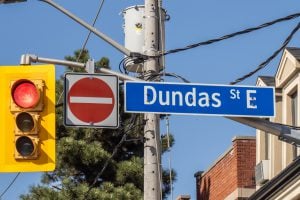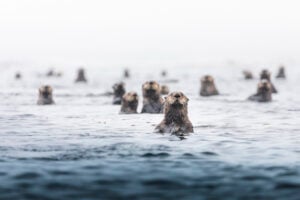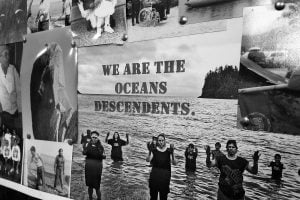
People & Culture
Renaming places: how Canada is reexamining the map
The history behind the Dundas name change and how Canadians are reckoning with place name changes across the country — from streets to provinces
- 4574 words
- 19 minutes
People & Culture
The Montreal-based singer-songwriter shares his experience exploring the forests and scenery of Haida Gwaii

There are a lot of amazing places in Canada to choose from; the Rockies, for example, are fantastic. But while I’ve done a lot of travelling in my life, I’ve never seen a forest as magical as the one at Haida Gwaii. It’s the most beautiful place I’ve ever seen in this country, without question.
Being there, I knew I was inside Canadian borders, but I felt in a really interesting way like I was somewhere beyond them. What sticks in my mind most is the moss. It was everywhere. The only place I’ve noticed moss like that was in Iceland, but even this was different. I remember walking in the woods and not even being able to see the bark of the trees. It was all just green. The forest looked soft and it reminded me of a fairy tale, not a Walt Disney fairy tale but an older kind. Whenever you’re in a place full of moss, it eats up a lot of the sound. So there was a quiet in the forest which I found really lovely, too.

I visited on the Canada C3 ship in 2017, along with a collective of Canadian artists, scientists and organizers. The organizers would film a video about our experiences every day and that night I would stay up all night and score it. I was just responding to each place. I had a little studio on board, in my cabin. That’s how I paid my way on the boat, I promised I would do music.
At Haida Gwaii, we were shown around by Indigenous guides. It’s one thing going to a place, and another being escorted by someone from there. Coming from a pretty sheltered background in Hudson, near Montreal, and not having had that much contact with Indigenous people growing up, never having been to a reserve before either, visiting somewhere where they were co-managing the place was quite remarkable to me. I felt very much like a visitor, culturally, and like there was a certain respect between us and the locals, like we were asking permission to be there. It seemed also to me that there was a palpable soul to the area, in terms of the folklore and the untouched feel of much of the wilderness.
The guides told us stories, like how a lot of Haida Gwaii would have been logged without them stepping in. I don’t think we give enough credit to the people there for that. Some of the elders talked about those times, how they would go in groups and stay up all night putting big metal rods in the trees to stop them from being cut down. They did this at the risk of their own legal safety. It made me realize how much their community suffered to keep Haida Gwaii the way it is. I feel we in Canada owe them a great debt. We wouldn’t be the country we are now without places like it. It’s a really special and important spot that people should know about, historically speaking. And when you see what they saved, you’re like, “Holy crap!”
After the trip, I saw Canada very differently. It made a part of me wish that the whole country was run like Haida Gwaii, with allowance for more natural spaces. It was an exceptional experience of nature, there. It was the first time I really had the sensation of realizing how much we’ve lost, in Canada, in terms of its wilderness, how different our country could have been in a lot of ways. Or hopefully how we could look forward to it being in the future.
When I think of the forest at Haida Gwaii I imagine it as totally wild, wild in a way I’ve never seen before. It’s very thick and humid. I remember watching the sunlight come through the canopy of trees, seeing it hit this spiderweb full of water, and how surreal and beautiful it looked. We saw a grizzly bear too, which was intense. But we were with our guides. They know the bears, and what distance to keep from them. They explained that the bears know their smell and so they don’t get as aggressive. I also think of the ravens that were there. They had a presence I wasn’t accustomed to from the crows or ravens we see in the East. I was so struck by their voices, by the way they communicated. They just seemed like the smartest animals in the world. And I remember the smell. Haida Gwaii, and the West Coast in general, just smells healthy. It smells like you went jogging, even though you didn’t. Like you ate a salad. I really enjoy that.

From our big Canada C3 ship, we took smaller, inflatable boats to access the more remote parts of the islands. On the inflatable boats we saw humpback whales in the water, and these incredibly enormous jellyfish. When you’re near a forested environment you don’t expect to see jellyfish, but of course Haida Gwaii is surrounded by the ocean. And they were massive animals, so big and gorgeous. I also remember the pebbles of some of the beaches we were on. They were these beautiful black pebbles, like I’ve never seen before. They were remarkable.
My first impression of the forest at Haida Gwaii was: “This is a cathedral.” To me it was like the Notre-Dame of Canadian forests, like a church of nature. I’ve just never seen a location as enchanting as that. It was a moving place, and I feel it really has impacted me very strongly.
– As told to James Ivison
Are you passionate about Canadian geography?
You can support Canadian Geographic in 3 ways:

People & Culture
The history behind the Dundas name change and how Canadians are reckoning with place name changes across the country — from streets to provinces

Wildlife
As the sea otter begins its long-overdue return to Haida Gwaii, careful plans are being laid to welcome them — and to preserve a prosperous shellfish harvest

Environment
The people and landscapes of Haida Gwaii opened my eyes to the fact that we all rely on the ocean

People & Culture
The story of how a critically endangered Indigenous language can be saved